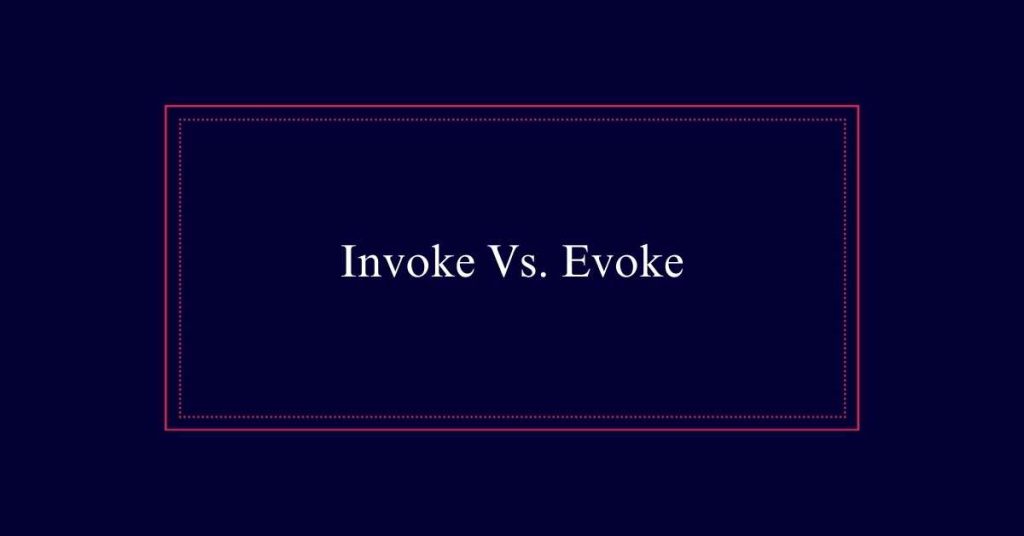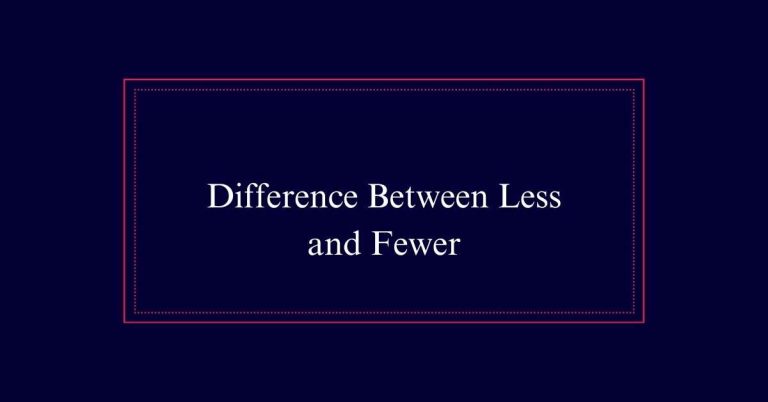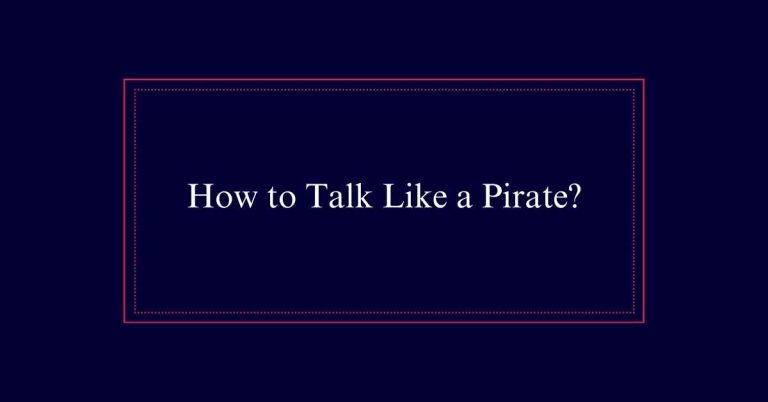Invoke Vs. Evoke
‘Invoke’ and ‘evoke’ serve different purposes. ‘Invoke’ means to call upon something for support or to bring something into existence. It involves a direct action, often with tangible outcomes, such as invoking laws or supernatural forces. ‘Evoke,’ on the other hand, implies bringing memories, feelings, or images to mind. It creates an emotional or intellectual response and is indirect. Invoke’ is more active and purposeful, while ‘evoke’ is passive and subtle.
Definitions of Invoke and Evoke
Understanding the definitions of ‘invoke’ and ‘evoke’ is essential for their correct usage in both written and spoken language.
‘Invoke’ typically means to call upon something, such as a law, principle, or deity, for support or to bring something into existence. It often has a direct, active effect. For example, invoking a law to support an argument or invoking a spirit in a ritual.
On the other hand, ‘evoke’ means to bring a memory, feeling, or image to mind. It is more passive and often creates an emotional or intellectual response. For instance, a song might evoke memories of childhood or a painting might evoke feelings of nostalgia.
How to Use Invoke
To use ‘invoke’ correctly, one must understand its meanings and contexts.
‘Invoke’ can mean to call upon for aid, such as invoking a deity or authority.
It can also mean to summon something into existence or conjure, like invoking a spirit.
Additionally, it is used to cite something, usually a law or rule, as in invoking Article 50 of the Lisbon Treaty.
Finally, ‘invoke’ can mean to bring about or cause a particular effect.
For example, invoking fear or admiration.
This term is active and direct, often producing a tangible or material outcome.
How to Use Evoke
‘Evoke’ is used to bring a particular emotion, memory, or image to mind. When you evoke something, you trigger a response that is often emotional or intellectual.
For instance, a song might evoke memories of a past event, or a painting might evoke feelings of serenity. This term is often used in literature, art, and everyday speech to describe how certain stimuli can bring forth specific thoughts or emotions.
Unlike ‘invoke,’ which is active and direct, ‘evoke’ has a more passive and indirect effect. For example, a well-written story can evoke laughter or tears, depending on its content.

Invoke: Aid and Summoning
When you invoke something, you actively call upon it for aid or summon it into existence. This action is deliberate and purposeful. For instance, in religious contexts, one might invoke a deity for protection or guidance. Similarly, in literature, a character might invoke a supernatural force to assist them. This usage often implies a higher power or authority being called upon.
In another example, a person might invoke a spirit or entity through rituals. This act of summoning can have tangible effects in the story or scenario. Unlike evoking, which is more about emotions or memories, invoking creates a direct and often material impact. It is about bringing something forth with intent and purpose.
Invoke: Legal and Causative Uses
Apart from summoning aid or supernatural forces, invoking also plays an important role in legal contexts and causative scenarios.
In legal terms, to invoke means to cite a law, rule, or authority to support a case. For instance, a lawyer might invoke a specific statute to argue their client’s position. This usage is essential in legal proceedings where precise references to laws and precedents are important.
In causative scenarios, to invoke means to bring about a particular effect or situation. For example, a policy change might invoke new regulations that impact business operations. Here, invoking is about initiating a series of actions or outcomes.
Evoke: Emotions and Memories
Emotions and memories can be powerfully brought to mind through various stimuli, such as music, scents, and images. This process is known as evocation, a passive yet profound way to recall past experiences.
For example:
- Music: A song can transport someone back to a significant moment, evoking joy or sadness.
- Scents: The smell of fresh bread might remind someone of their childhood home.
- Images: A photograph can bring to mind a long-forgotten event or place.
- Touch: Feeling a particular fabric can evoke memories of a cherished item.
Evoke: Images and Laughter
Certain stimuli can evoke vivid images and spontaneous laughter, creating an immediate emotional response.
For instance, a nostalgic photograph can instantly bring to mind a cherished memory, painting a mental picture that feels almost tangible.
Similarly, a well-timed joke or a humorous situation can evoke laughter, brightening the mood and fostering a sense of joy.
These reactions are often involuntary, triggered by sensory inputs that tap into our emotions and experiences.
The power of evocation lies in its subtlety; it doesn’t force an image or emotion but gently calls it forth.
Active Vs. Passive Effects
The distinction between invoke and evoke lies in their active versus passive effects. To invoke is to call upon directly, often with a specific intent or result. It has an active role in causing something to happen.
Conversely, to evoke is to bring something to mind indirectly, often eliciting an emotional or intellectual response. This makes it more passive.
Here are four key differences:
- Invoke: Actively summons aid or forces.
- Evoke: Passively brings forth emotions or memories.
- Invoke: Can cite laws or authority.
- Evoke: Typically associated with sensory or mental imagery.
Material Vs. Emotional Impact
Understanding the material versus emotional impact of ‘invoke’ and ‘evoke’ is essential for precise communication.
‘Invoke’ often has a material outcome. It calls upon forces or laws, bringing about concrete change. For instance, invoking a law can lead to legal consequences. This term implies a direct and tangible effect.
In contrast, ‘evoke’ generates an emotional or intellectual response. It brings memories, images, or feelings to mind. For example, a song might evoke nostalgia, creating a sentimental experience. This term suggests an indirect and intangible impact.
Choosing between ‘invoke’ and ‘evoke’ depends on the desired effect. Use ‘invoke’ for actions with physical or legal consequences. Use ‘evoke’ for eliciting feelings or thoughts.
Real-World Examples
Real-world examples can effectively illustrate the distinct uses of ‘invoke’ and ‘evoke’ in various contexts.
- Legal Context: ‘One decision is absolutely in London’s hands: when to begin the process of withdrawal by invoking Article 50 of the Lisbon Treaty.’ This shows ‘invoke’ used in a legal context.
- Historical Context: ‘The ‘Devil’s Bible’ continues to invoke fascination and fear hundreds of years after it was written.’ Here, ‘invoke’ brings forth a reaction.
- Emotional Impact: ‘Baaba Maal’s tribute to Nelson Mandela, Njilou, begins with vocalisations that evoke traditional music from Senegal.’ This example shows ‘evoke’ bringing an emotional response.
- Literary Context: ‘In the hideous picture which its presence evokes, it seems to be most terribly a part of what it does.’ This illustrates ‘evoke’ in a descriptive narrative.






